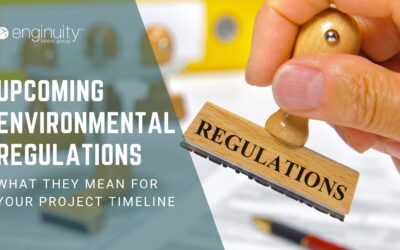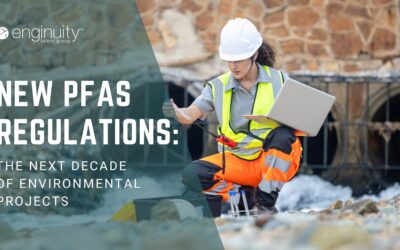Hiring for environmental roles requires more than just matching qualifications on paper. While a resume can offer a quick glance at an applicant’s education and job history, it rarely tells the whole story, especially in a specialized and rapidly evolving field like environmental science. As firms grapple with increasingly complex regulatory demands, project scopes, and sustainability goals, identifying talent who can think critically, communicate effectively, and adapt to shifting industry standards is more crucial than ever. Employers need to dig deeper to assess traits like curiosity, resilience, and interdisciplinary thinking. These are the qualities that shape strong, forward-thinking professionals who can lead environmental initiatives and influence meaningful change across projects and organizations. By understanding what truly sets standout candidates apart, hiring managers can make more confident decisions, build high-performing teams, and foster long-term success in a competitive talent landscape.
Critical Thinking and Problem Solving
In environmental work, where data often has to be interpreted quickly and solutions customized to each unique site, critical thinking isn’t a bonus, it’s a baseline. The best candidates aren’t simply applying textbook responses to routine problems. Instead, they demonstrate a deep ability to evaluate competing priorities, understand long-term implications, and offer creative yet compliant strategies. Whether navigating wetland mitigation or air quality analysis, these professionals must take initiative, ask the right questions, and dig into underlying causes before rushing to action. Interviewers should listen for how candidates describe past challenges, including how they gathered data, involved stakeholders, and adjusted plans when initial approaches failed. Those insights can reveal just how comfortable someone is with ambiguity and whether they have the mindset to manage dynamic environmental tasks.
Beyond technical projects, problem-solving also means working well under pressure. A candidate who has managed tight regulatory timelines or unexpected permitting hurdles can speak volumes about their flexibility and preparedness. It’s not just about what they’ve solved, but how they handled the process, from identifying root issues to collaborating across disciplines. These nuances are often better indicators of long-term success than technical certifications alone. You’ll find that well-rounded candidates with strong problem-solving histories often stand out early in the environmental recruitment process, even if their resumes look similar to others on the surface.
Interdisciplinary Collaboration
Environmental professionals rarely operate in isolation. On any given day, they may interact with civil engineers, municipal planners, chemists, public stakeholders, or regulatory agencies. Candidates who have successfully contributed to cross-functional teams bring more than just environmental expertise; they offer perspective, adaptability, and the communication skills needed to unify goals and drive progress. Interviewers should probe for examples of how applicants have managed relationships across departments or firms. Did they adapt their communication style for nontechnical audiences? Were they able to mediate between conflicting priorities?
These soft skills can often reveal how someone might function within your broader organization. While job history might suggest they’ve held interdisciplinary roles, the key is in how they speak about them. Do they sound siloed or do they describe their work with awareness of the larger system? Environmental firms increasingly need team members who can bridge science with operations and diplomacy with delivery. This well-rounded collaboration is especially essential in roles where compliance and sustainability converge.
As more firms expand into joint ventures or integrated project delivery models, collaboration becomes a skill worth prioritizing from the start. Many job seekers with backgrounds in project management or consulting have sharpened these skills through experience. You’ll often see this reflected in those who excel in multi-disciplinary engineering environments, making them strong additions to growing teams.
Passion for Sustainability and Stewardship
A strong resume can tell you where someone has worked, but it doesn’t always show you why they do what they do. Environmental professionals driven by a sense of mission bring enthusiasm and a deeper sense of purpose to the role. Hiring managers should look for indicators of passion, not just technical capability. Candidates who stay involved in industry associations, publish sustainability-related work, or volunteer in local environmental programs tend to approach their careers with more dedication. Their investment goes beyond the paycheck, and that often results in longer tenure, stronger internal advocacy, and innovation within the team.
Interview questions that invite storytelling—like asking what first drew them to the environmental field or what accomplishment they’re most proud of—can bring these passions to the surface. You may also want to explore how candidates stay current on green technologies, climate legislation, or global environmental trends. Passionate professionals naturally keep learning, which means they’re less likely to grow stagnant in evolving roles. This can be especially valuable in firms looking to build long-term environmental leadership or fill positions with growth potential.
It’s also worth remembering that passion influences team dynamics. People who truly care about their work tend to elevate those around them, improve morale, and reinforce a culture of sustainability. That ripple effect often outweighs minor technical gaps during the hiring process.
Field Experience and Adaptability
Not all environmental work happens behind a desk. Site visits, field surveys, sampling, and inspections often bring professionals into unpredictable settings,remote locations, variable weather, or complex terrain. Candidates with real-world field experience typically have stronger instincts for risk management, compliance, and logistics. Their ability to navigate unplanned obstacles or shift gears in real time offers a distinct advantage, especially in roles where regulations or conditions change rapidly. While this experience might be mentioned on a resume, it’s the stories behind the bullet points that matter most.
Ask how they prepared for complex fieldwork or how they adapted when plans changed mid-project. These answers can reveal how they think on their feet, communicate under pressure, and integrate hands-on findings into broader strategies. In today’s environmental job market, versatility is key. Field-ready professionals who are just as effective in a regulatory meeting or client briefing are in especially high demand.
Adaptability also means being comfortable with emerging tech and digital tools. Candidates who can use drone data, GIS mapping, or environmental modeling software demonstrate the agility that many firms now seek. These capabilities often tie directly into success in modern environmental engineering roles, where digital fluency meets ecological know-how. A resume might not capture that full skill set, but your conversations certainly can.
Strong Communication and Reporting Skills
Environmental work often involves turning complex scientific findings into clear, actionable reports for a wide range of stakeholders. Professionals who can effectively translate technical language into accessible information are invaluable, especially when regulatory bodies, community members, or internal leadership are involved. A candidate’s ability to explain site remediation plans or present environmental impact data in plain terms can make or break stakeholder buy-in. It’s not just about clarity, though; it’s also about tailoring communication to suit the audience.
Look for candidates who have experience preparing compliance documents, delivering presentations, or responding to public inquiries. These are real-world indicators of polished communication skills. Their ability to pivot between technical precision and accessible explanation demonstrates maturity and audience awareness. This is particularly important for firms that interact with the public or must regularly brief clients, municipalities, or cross-functional teams.
Effective communication also reinforces internal collaboration. Candidates who excel in this area often help bridge gaps between disciplines or departments. If you’re hiring for roles with external visibility or regulatory obligations, this skill set becomes even more critical. Consider the kind of communication that supports success in environmental consulting roles, Candidates who have been trusted with client-facing reports or policy briefings often stand out for a reason.
Attention to Detail and Documentation
In environmental compliance, the smallest oversight can lead to project delays, fines, or public backlash. Attention to detail is more than a personality trait, it’s a necessity. Hiring managers should listen carefully for how candidates manage documentation, track regulatory changes, and maintain audit-ready records. This could include everything from sampling logs to site assessments and environmental impact statements. These are all areas where rigor and consistency count.
One way to uncover this strength in interviews is to ask about past experiences with audits, inspections, or permitting processes. Candidates who can clearly walk through documentation steps, version control, and stakeholder communication tend to be strong detail-oriented thinkers. It’s also worth looking at how they’ve handled changes. Did they have systems in place to manage unexpected updates or new reporting requirements?
Those with a background in formal reporting, especially in roles involving permitting or remediation, often bring a level of thoroughness that benefits both day-to-day work and long-term project quality. You’ll often see this meticulousness reflected in professionals applying to specialized roles in environmental sciences, where oversight can have costly consequences.
A History of Long-Term Project Involvement
While job titles and employers may show where someone has worked, they don’t always reflect the depth or longevity of their experience. In environmental fields, long-term project exposure often leads to a richer understanding of lifecycle management, regulatory follow-through, and client relationships. Candidates who have seen a remediation plan or environmental assessment through from start to finish often have more comprehensive experience than those who’ve only touched one phase.
When reviewing candidates, dig into the context of their project roles. Did they see it through final approvals? How involved were they in planning, execution, and reporting? Their level of exposure can help you distinguish between surface-level experience and operational depth. Long-term project participation also indicates resilience and commitment, traits that benefit every firm.
If you’re hiring for roles where continuity and trust are critical, look for applicants who’ve stayed engaged across multiple project milestones or returned to work with repeat clients. These are signs of reliability and reputation, both key to team success. Roles like project managers in the environmental field often require exactly this level of involvement and dependability.
Values Alignment and Culture Fit
Even the most qualified environmental professional can be the wrong hire if their values don’t align with your organization’s mission or culture. In today’s workplace, where collaboration and accountability shape how teams function, it’s essential to consider cultural compatibility. This doesn’t mean hiring clones, it means seeking professionals whose approach to sustainability, integrity, and innovation resonates with your company ethos.
Culture fit becomes even more important when teams are small, highly collaborative, or field-based. Someone who understands your firm’s vision and demonstrates alignment in their past choices will integrate more naturally and contribute to a stronger team dynamic. This might be reflected in the types of projects they pursue, their involvement in sustainability communities, or their willingness to mentor junior staff.
Questions about values and past team experiences can reveal how someone might contribute beyond their technical duties. A candidate who describes leading with transparency, adapting to shifting organizational priorities, or advocating for ethical practices might be the perfect addition to your team. Firms focused on cultivating this kind of long-term talent might also benefit from reviewing resources like this guide to retaining engineering professionals for broader insight into alignment and longevity.
Building Better Teams Starts With Better Insights
In an industry where regulations evolve and environmental concerns intensify, the need for high-performing, well-rounded professionals has never been greater. While resumes provide the basics, the most successful environmental hires often stand out through their soft skills, adaptability, and long-term value, not just their credentials. By focusing on attributes like communication, collaboration, and purpose-driven work, hiring managers can identify the right people to lead projects, grow teams, and uphold environmental integrity.
Whether you’re hiring for field-based remediation work, policy-driven consulting, or strategic leadership roles, paying attention to what isn’t on paper can give your team the edge it needs. And if you need help finding the professionals who offer that edge, Enginuity Advantage offers the insight, industry experience, and environmental recruiting expertise to support your search.





0 Comments